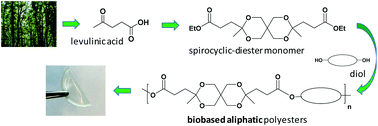Biobased aliphatic polyesters from a spirocyclic dicarboxylate monomer derived from levulinic acid†
Abstract
Levulinic acid derived from lignocellulose is an important biobased building block. Here, we report on the synthesis and polymerization of a rigid spirocyclic diester monomer to produce polyesters and copolyesters. The monomer was prepared via a one-step acid catalyzed ketalization involving ethyl levulinate and pentaerythritol by employing a straightforward, solvent-free, and readily scalable method which required no chromatographic purification. Still, careful removal of traces of water from the spiro-diester prior to polycondensations proved crucial to avoid side reactions. A preliminary life cycle assessment (LCA) in terms of greenhouse gas (GHG) emissions indicated that the corresponding spiro-diacid tended to be environmentally favourable, producing less CO2 emission than e.g., biobased succinic acid and adipic acid. A series of aliphatic polyesters with reasonably high molecular weights was subsequently prepared in melt and modified melt polycondensations of the spiro-diester with 1,4-butanediol, 1,6-hexanediol, neopentyl glycol and 1,4-cyclohexanedimethanol, respectively. The resulting fully amorphous polyesters showed glass transition temperatures in the range 12–49 °C and thermal stability up to 300 °C. Hot-pressed films of the polyesters based on neopentyl glycol and 1,4-cyclohexanedimethanol were transparent and mechanically strong, and dynamic melt rheology showed stable shear moduli over time to indicate good processability. In addition, the spiro-diester monomer was employed in copolycondensations with diethyl adipate and 1,4-butanediol and demonstrated good reactivity and stability. Hence, the results of the present study indicate that the spiro-diester based on levulinic acid is an effective monomer for the preparation of aliphatic polyesters and other condensation polymers.



 Please wait while we load your content...
Please wait while we load your content...